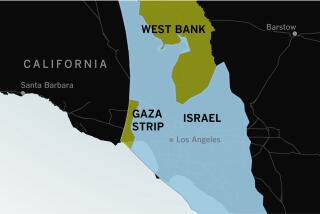Soviet POWs, Deserters to Get Amnesty
The Soviet Union declared an unconditional amnesty Monday for all its troops who deserted in Afghanistan or left to live in other countries after being captured by Afghan rebels.
Alexander Y. Sukharev, the Soviet procurator general, said the government wants to make certain that all Soviet soldiers listed as captured or missing in action know that they are welcome to return home and will not be prosecuted, even if they collaborated with the enemy.
The Soviet government believes that about two-thirds of the 312 soldiers listed as missing in action are being held captive by the moujahedeen, either in remote parts of Afghanistan or in Pakistan. However, it acknowledges that perhaps as many as 40 or 50 have been released to settle in the United States, Canada and Western Europe.
One former prisoner, Nikolai Ryzhkov, 22, who returned in January, 1985, after 18 months in the United States, where he denounced Soviet intervention in Afghanistan, had been found guilty of deserting, of assisting the moujahedeen and of anti-Soviet propaganda. He was sentenced to 12 years in prison.
Sukharev said that Ryzhkov has been pardoned and was released from prison over the weekend.
“On behalf of the Soviet state,” Sukharev told a news conference, “I declare that the soldiers who were serving in the limited contingent of Soviet troops in Afghanistan and who return home after being held prisoner and staying in foreign countries will enjoy in full all the political, social and other rights of Soviet citizens. . . .
“As for those who were unable to resist hostile propaganda, who did not overcome the sufferings and deprivation of captivity and carried out illegal acts to the detriment of our country, they will all be granted amnesty in conformity with the high principles of socialist humanism.”
Although senior Soviet government officials and military officers indicated earlier that returning soldiers would not be prosecuted, Sukharev’s formal declaration sought to clear up any ambiguity. Several American groups have been trying to persuade prisoners not to return home, warning that they face prosecution and long prison sentences if they do.
The question also arises because, after World War II, more than 1.5 million Soviet soldiers released from Nazi prisoner-of-war camps went directly into Soviet prison camps on their return home, and tens of thousands were executed, on grounds that they should have fought to the death and certainly must have been compromised during their time as prisoners.
Sukharev said the government hopes that Soviet prisoners and other former captives now in the West will read the statement as an appeal from their motherland to return and to help in healing the wounds of that country’s longest modern war. Soviet troops first intervened in the Afghan conflict in 1979.
The statement is yet another acknowledgement that the Afghan war, into which hundreds of thousands of Soviet soldiers were thrust and from which Moscow is now withdrawing, put the young troops into very difficult conditions.
‘Extreme Conditions’
“Understanding the extreme character of the conditions in which these soldiers found themselves, the hardships and sufferings that became their lot in prison and in foreign lands,” the statement said, “the Soviet people have never lost faith in their compatriots, in humanism and justice.
“They hope that the years (the soldiers) have spent far from their motherland have not changed their views on life, on our socialist values, and have not smothered their patriotic feelings.”
He also said that the government is talking with Pakistan and the United States, seeking their help in repatriating the soldiers.
More to Read
Start your day right
Sign up for Essential California for news, features and recommendations from the L.A. Times and beyond in your inbox six days a week.
You may occasionally receive promotional content from the Los Angeles Times.






